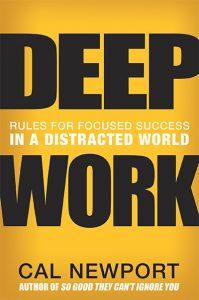Yesterday I finished reading Cal Newport’s book Deep Work: Rules for Focused Success in a Distracted World. Newport is a computer science professor at Georgetown University. 
This book has been quoted in tons of other books and articles I have read, so I was excited to read it for myself. (My preferred reading genre is what I like to call “inspirational non-fiction” and this definitely fits right in!)
The book is broken up into two main parts: explaining why “deep work” is valuable and his suggestions about how to make space in your life to do the deep work. He defines deep work as: “Professional activities performed in a state of distraction-free concentration that push your cognitive capabilities to their limit. These efforts create new value, improve your skill, and are hard to replicate” (p. 3).
His explanation of why deep work is valuable is well-researched, thorough, and convincing. He has employed methods of deep work over the past decade and has a crazy amount of academic publications, a few books, and tenure at Georgetown to show for it. (He’s also a dad of two small kids and doesn’t work after 5:30 pm.) Newport recognizes that we cannot live our entire lives in the state of completing deep work. We can, however, organize our lives such that deep work can be done regularly. Here are three key lessons I took after reading this book.
3 lessons learned
Look at your schedule and figure out when deep work can be done
Newport explains many different approaches, such as bimodal philosophy (dividing your time clearly for some stretches for deep work and other stretches for everything else), a rhythmic philosophy (create a simple yet regular habit of deep work), or a journalist approach (fit deep work wherever you can in your schedule). There is not one right way; there is just a right way for you. But you must make the space for this deep work to happen, or our days and weeks will be filled with other, not so deep, work. The benefits of deep work are not going to magically appear as you answer email. You must create the space to push your cognitive abilities forward.
Cut back on shallow work
Newport explains shallow work as the tasks that are noncognitive demanding tasks, that can be performed while distracted, and are easily replicated. Every job will have shallow work but the goal here is to cut back on how much of it you do. He suggests creating time for your shallow work, just as you do for deep work. Then you can batch the tasks and be intentional about completing what’s needed, without getting lost in only shallow work. He also suggests saying no to shallow work more often–I could definitely be better at that. This relates to another key point Newport makes in the book, in which he suggests it may be worth quitting social media. This may be a big jump for many people, but he makes many interesting points about how easy it is use social media as a distraction to deep work.
Put more thought into your leisure time
This phrase came from Arnold Bennett, an English writer born near the turn of the twentieth century. Newport explains that it is very easy to spend evenings with whatever grabs our attention first, for example scrolling through Instagram or mindlessly watching TV. The issue is that the activities that catch our attention right away are not always the activities that would lead to the feeling of being relaxed and rejuvenated. For example, for my husband it is much more relaxing to spend 20 minutes playing guitar as opposed to reading the news on Twitter for 20 minutes, or for me I feel much more relaxed if I’ve read a good book for 20 minutes rather than check out Facebook. If we are not intentional about our leisure time, the hours can go by unnoticed, leaving us often just more tired.
These lessons learned have definitely given me ideas for reflecting on my schedule for the upcoming school year. I am already brainstorming about how I can create the time and space for more deep work, and what that deep work will be.
And, although I am not quitting all social media, I did leave my phone inside as I write this blog post outside on my computer that is in airplane mode. The shallow work of social media, checking email, or unloading the dishwasher will be there later. Right now is time for reflecting, writing, creating, synthesizing–you know, deep work.
